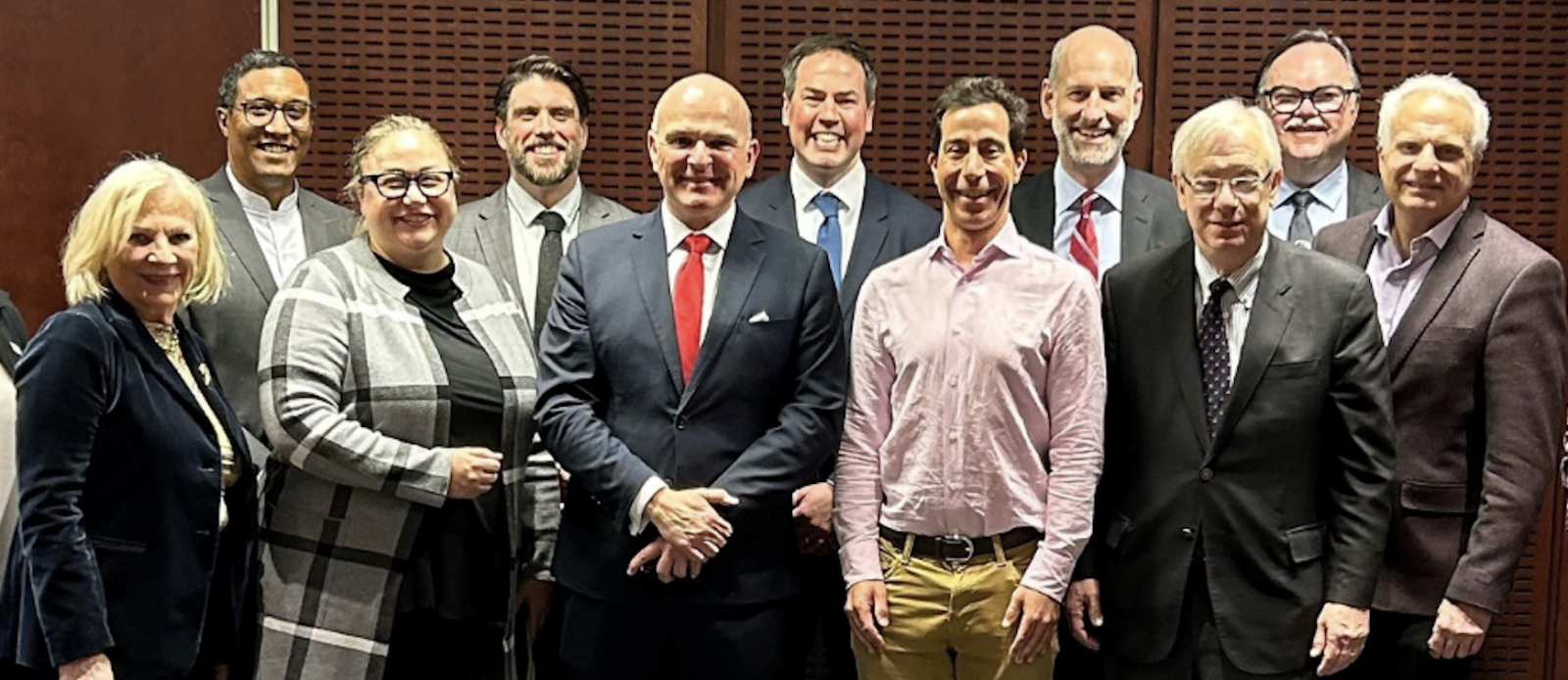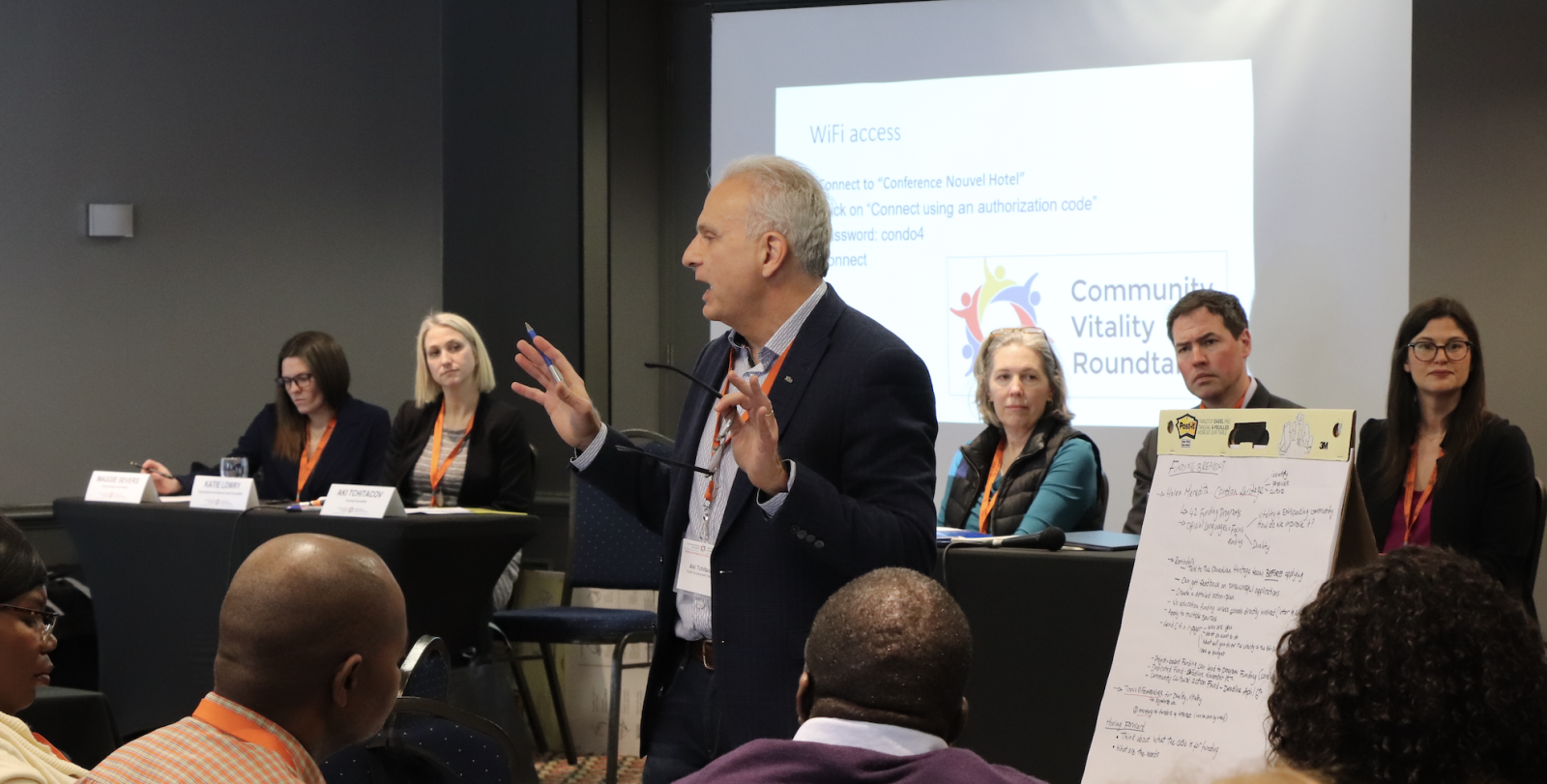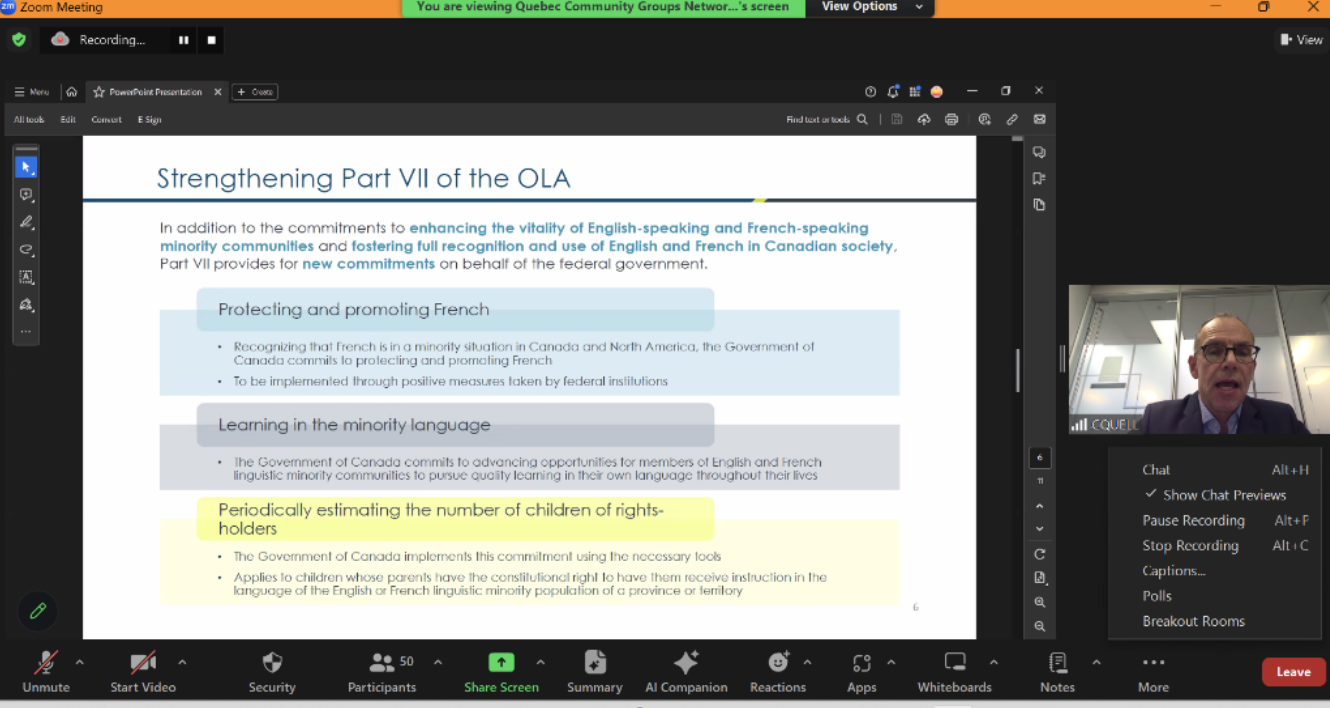
President's Message
QCGN AND COMMUNITY FIND COMMON CAUSE WITH FELLOW QUEBECERS
Report from QCGN President Eva Ludvig
 Over the past few months, the Quebec Community Groups Network has been finding common cause with fellow Quebecers on a number of significant issues. That includes standing up for world-class universities that are important institutions of our community and of Quebec as a whole. It may seem a small thing, but QCGN joined the chorus of voices expressing unhappiness with the English-only national anthem at the NHL All-Star Game held in Toronto in February. We also find common ground with many Quebecers on issues ranging from the protection of Quebec culture to the touchy issues of immigration and mutual opposition to Quebec's Secularism Law (Bill 21) which prohibits certain public sector employees from wearing religious symbols while on duty. Discovering areas of shared interests with fellow citizens is key to advocating for change on the issues we agree on and opening the doors for collaboration and cooperation across languages and cultures. And it is essential at a time when our government is not listening to the many constituents who do not share the Coalition Avenir Québec's socio-political views.
Over the past few months, the Quebec Community Groups Network has been finding common cause with fellow Quebecers on a number of significant issues. That includes standing up for world-class universities that are important institutions of our community and of Quebec as a whole. It may seem a small thing, but QCGN joined the chorus of voices expressing unhappiness with the English-only national anthem at the NHL All-Star Game held in Toronto in February. We also find common ground with many Quebecers on issues ranging from the protection of Quebec culture to the touchy issues of immigration and mutual opposition to Quebec's Secularism Law (Bill 21) which prohibits certain public sector employees from wearing religious symbols while on duty. Discovering areas of shared interests with fellow citizens is key to advocating for change on the issues we agree on and opening the doors for collaboration and cooperation across languages and cultures. And it is essential at a time when our government is not listening to the many constituents who do not share the Coalition Avenir Québec's socio-political views.
The QCGN has always understood these realities and it is part of the reason that we took steps in recent years to broaden our membership base, making more room for Quebecers from all backgrounds to join the discussion. This week marks one year since long-time advocate for the community Martin Murphy, joined the QCGN as its first individual member. Since then, more than 100 individual Quebecers from various regions and backgrounds have become involved. We look forward to seeing this number continue to grow as we approach our next AGM on June 20, and in the coming months we will be announcing new measures to make membership in the network more accessible.
QCGN endorses lawsuits filed by McGill and Concordia
Last week, the QCGN stood solidly with McGill and Concordia universities, which filed simultaneous lawsuits against the Legault government last week in an attempt to reverse harmful tuition hikes that target out-of-province students.
We understand they had no choice while staring into the face of a government that continues to see the curtailing and denigrating of Quebec's English-speaking community as its only means of protecting and promoting the French language. The Legault government has mishandled this file from the get-go, and it is doing untold damage not only to Quebec institutions of higher education respected around the world, but to the economies of Montreal and, indeed, all Quebec.
The two universities have clearly demonstrated the dangers of the government's ill-considered plan to increase substantially undergraduate tuition for students from outside Quebec who study in English, as well as to impose unrealistic demands for French fluency upon graduation for all students at English-language universities. The government's stubbornness in clinging to its harmful policy in the face of a tidal wave of criticism from French-language universities, business leaders in Montreal and across the province, the Mayor of Montreal, political leaders in Quebec and across Canada, and voices in the international higher-education community has been breathtaking.
It is unfortunate that institutions of the English-speaking minority in Quebec are again forced to seek remedy from the courts for decisions made by the government without meaningful consultation with our community. The courts are an option of last resort. English-speaking Quebec and its institutions have and continue to make invaluable contributions to Quebec. We are nous, not les autres! When will the Government of Quebec realize this and begin including us in their decisions?
This is what we would say to Premier François Legault: Jettison this policy and find positive ways to protect and promote French which we would wholeheartedly support.
Québécois culture is also our culture
What are expected to be the final major elements of the Quebec government's Action plan for the promotion and protection of French have come into view. They focus on media and culture – immigration, university tuition and other issues having already been dealt with.
A report commissioned by Culture Minister Mathieu Lacombe on the cultural sovereignty of Quebec in the digital age, provides the broad outlines of coming legislation in this area. Penned by Louise Beaudoin, Clément Duhaime, Véronique Guèvremont and Patrick Taillon, the report provides arguments on how to improve the "discoverability" of Quebec cultural content in the digital landscape. In La souveraineté culturelle du Québec à l'ère du numérique : Rapport du comité-conseil sur la découvrabilité des contenus culturels, the expert committee makes 32 recommendations regrouped in three themes: a proposed partnership for Quebec to negotiate with the federal government; stronger alliances with international allies, particularly France; and proposed legislative actions to adapt laws to new digital realities.
In his editorial of February 5 Agir pour notre avenir, sans permission, the publisher of Le Devoir Brian Myles describes the difficulty in finding French-language cultural content on digital media platforms as a major challenge for the vitality of Francophone culture and the growth of creative talent. We agree. As we have been saying for a long time, a large proportion of Quebec's English-speaking community, and certainly the Quebec Community Groups Network, support positive measures to protect and promote the French language.
We find common cause with Quebecers who are worried about an avalanche of English-language cultural content overwhelming what is produced and broadcast in French, here and elsewhere. And we agree it would be a good idea for the federal government to collaborate with Quebec; not only is this an issue that touches francophones across Canada, and also requires a significant degree of international co-operation, but it provides Ottawa with an opportunity to act within the context of its newly revamped Official Languages Act.
Meanwhile English-speaking artists risk being caught between two extremes: having no place in an ecosystem that seeks only to prioritize and protect French-language Quebec content, or navigating an ecosystem where English-speaking creators are not necessarily able to distinguish themselves in the vast international array of English-language content. As was recently pointed out to Minister Eric Girard during a recent consultation, it cannot be taken for granted that English-speaking artists from Quebec can automatically carve out a place for themselves on the international market.
As always, details are important. There will be more legal details in any law presented by Culture Minister Lacombe in the coming weeks, and we'll be watching carefully. But we are pleased to find a positive approach we can and should support. As Quebecers, we enjoy a sumptuous buffet of cultural opportunities that is often the envy of our fellow Canadians. Québécois culture is also our culture, as full-fledged Quebecers, and we are richer for it.
Speaking English
 Would that everyone was so broad minded. A few recent examples of linguistic narrow-mindedness on the part of political and other leaders provoked sighs of frustration. Federal Opposition Leader Pierre Poilievre, in Pointe Claire for an event, balked at answering a journalist's question in English. "We're in Quebec – right?" he responded. Poilievre may not be aware that 70 per cent of the population of Pointe Claire is English speaking.
Would that everyone was so broad minded. A few recent examples of linguistic narrow-mindedness on the part of political and other leaders provoked sighs of frustration. Federal Opposition Leader Pierre Poilievre, in Pointe Claire for an event, balked at answering a journalist's question in English. "We're in Quebec – right?" he responded. Poilievre may not be aware that 70 per cent of the population of Pointe Claire is English speaking.
Meanwhile, former Montreal mayor and contender for the provincial Liberal leadership Denis Coderre told The Montreal Gazette's Corner Booth Podcast that "if somebody serves me in English, I refuse to buy."
Not helpful!
Worse was a story out of Pontiac recounted by Bonnie James, an editorial writer at the Pontiac Journal. Toward the end of January, a 14-year-old boy went missing. The two communities in the area where the boy was believed to be located are both English speaking, but the Sûreté du Québec's communication with the communities was only in French. The SQ justified this by citing the Charter of the French Language (Bill 96) saying in response to a suggestion they should have used both languages: "We must promote the sole use of French in our activities, including electronic communications with the public… French is both the official and most common language of public life in Quebec."
The SQ had it wrong here as far as the law is concerned. The Charter makes a clear exception for cases of public safety: Section 22.3 states "An agency of the civil administration may depart from paragraph 1 of section 13.2 by using another language in addition to French in its written documents … where health, public safety or the of natural justice so require." The good news is the boy was found safe and sound. But James and English-speaking leaders talked about the need for common sense and humanity.
French-language Commissioner blames decline on temporary immigrants
In his first report to the National Assembly, Quebec's French Language Commissioner Benoît Dubreuil contends the number of temporary immigrants in Quebec has "played a central role in the decline of the French language." And he estimates that it would cost between $10.6 and $12.9 billion for all temporary immigrants to complete an intermediate level of training in French.
We are in the process of studying the report, which runs to more than 100 pages, and requires careful consideration. At first glance, however, the astonishing figure of more than $10 billion to ensure the francization of temporary immigrants is both startling and worrisome. Could such an expenditure – more than 10 new roofs on the Olympic Stadium – persuade some people that the cost of integrating immigrants is too high and immigration levels should therefore be slashed? That could be devastating to Quebec's economy and harm all Quebecers.
It is worth noting that this report is about temporary – not permanent – immigrants, and includes university students, about whom the government has objected for not wanting to stay in Quebec after graduation.
Dubreuil acknowledges that it can take up to a year of full-time study to learn French – which is exactly what the English universities have been saying in the face of the government's demand that 80 per cent of out-of-province students achieve Level 6 in French proficiency by graduation. Some of the report's suggestions on how that might be achieved are, to say the least, unrealistic. They include expecting workers to cut their hours to study French and expecting businesses to foot the bill for French courses, including time lost at work.
QCGN congratulates Linda Leith on promotion within Order of Canada
 The QCGN warmly congratulates past-president Linda Leith, who has been named an officer of the prestigious Order of Canada for connecting the country's Anglophone and Francophone communities, and for fostering creativity and intercultural understanding through the Blue Metropolis Internation Literary Festival. In 1997, Linda founded Blue Metropolis, a QCGN member organization and she has been president of the Association of English-language Publishers of Quebec, another member group. Her Order of Canada citation reads: "A writer, publisher, translator and scholar, Linda Leith devotes herself to the promotion of Canadian literature in both official languages. As founder and former artistic director of Blue Metropolis International Literary Festival, she has helped bridge the gap of our country's linguistic duality. She founded Linda Leith Publishing | Linda Leith Éditions, one of the few literary publishing houses working in both English and French, and has been actively involved in dozens of educational, community and cultural endeavours in Quebec and across Canada." Linda was named to the Order of Canada in 2020, but the ceremony was delayed due to the pandemic. She was finally invested into the Order by Her Excellency the Right Honourable Mary Simon, Governor General of Canada, during a ceremony at Rideau Hall on February 20. In 2009, Linda was conferred the first ever Award of Excellence – Promotion of Linguistic Duality by Canada's Commissioner of Official Languages then Commissioner Graham Fraser. The award was given to groups or individuals which are not bound to the Official Languages Act, but whose leadership helped promote Canadian Linguistic Duality, in Canada or abroad, or helped the development of Official Language Minority Communities.
The QCGN warmly congratulates past-president Linda Leith, who has been named an officer of the prestigious Order of Canada for connecting the country's Anglophone and Francophone communities, and for fostering creativity and intercultural understanding through the Blue Metropolis Internation Literary Festival. In 1997, Linda founded Blue Metropolis, a QCGN member organization and she has been president of the Association of English-language Publishers of Quebec, another member group. Her Order of Canada citation reads: "A writer, publisher, translator and scholar, Linda Leith devotes herself to the promotion of Canadian literature in both official languages. As founder and former artistic director of Blue Metropolis International Literary Festival, she has helped bridge the gap of our country's linguistic duality. She founded Linda Leith Publishing | Linda Leith Éditions, one of the few literary publishing houses working in both English and French, and has been actively involved in dozens of educational, community and cultural endeavours in Quebec and across Canada." Linda was named to the Order of Canada in 2020, but the ceremony was delayed due to the pandemic. She was finally invested into the Order by Her Excellency the Right Honourable Mary Simon, Governor General of Canada, during a ceremony at Rideau Hall on February 20. In 2009, Linda was conferred the first ever Award of Excellence – Promotion of Linguistic Duality by Canada's Commissioner of Official Languages then Commissioner Graham Fraser. The award was given to groups or individuals which are not bound to the Official Languages Act, but whose leadership helped promote Canadian Linguistic Duality, in Canada or abroad, or helped the development of Official Language Minority Communities.
Free screening of What We Choose To Remember next Tuesday
 The QCGN also congratulates filmmaker Guy Rex Rodgers on the 40th screening of his documentary film What We Choose To Remember which takes place at Concordia University's DeSève Cinema next Tuesday, March 5 at 7 p.m. Guy's thought-provoking film explores the English-speaking communities of Quebec and their experiences from the turbulent years of the October Crisis to the present. More about the film here. Following this free screening, Guy will lead a conversation with the audience about why their families chose to live in Quebec, how they have adapted to changing expectations, and how they are anticipating the future. Reservations are on a first come first served basis. Click here to reserve your free seat today.
The QCGN also congratulates filmmaker Guy Rex Rodgers on the 40th screening of his documentary film What We Choose To Remember which takes place at Concordia University's DeSève Cinema next Tuesday, March 5 at 7 p.m. Guy's thought-provoking film explores the English-speaking communities of Quebec and their experiences from the turbulent years of the October Crisis to the present. More about the film here. Following this free screening, Guy will lead a conversation with the audience about why their families chose to live in Quebec, how they have adapted to changing expectations, and how they are anticipating the future. Reservations are on a first come first served basis. Click here to reserve your free seat today.
![]()
QCGN KEEPS BUSY WITH ADVOCACY AND OUTREACH ACTIVITIES
 The first two months of 2024 have exceptionally busy times on the political front for the QCGN.
The first two months of 2024 have exceptionally busy times on the political front for the QCGN.
In January, QCGN Vice-President Katherine Korakakis and Director General Sylvia Martin-Laforge met with Official Languages Minister Randy Boissonnault. The QCGN was pleased to meet with our main minister to better explain our role as a centre of evidence-based expertise and collective action for English-speaking Quebec. We discussed the renewal process we have undertaken to make the QCGN more representative of Quebec's English-speaking community with an updated mission, vision and values that make the QCGN more democratic, more collaborative, and open to diversity. We also told Minister Boissonnault that with more resources being transferred to the provinces in the federal Action Plan for Official Languages 2023-2028: Protection – Promotion – Collaboration, it is imperative that our federal and provincial governments work together to ensure our community gets its fair share of federal monies to support official language minority communities. And we insisted that decisions concerning the allocation of resources to our community be made through the lens of the Community Development Plan, a vision for collective action which was developed, shared, and endorsed by dozens of QCGN members, both organizational and individual, as well as multiple community stakeholders across Quebec.
Link spending to community priorities, Girard told
 Ensuring government allocations to our community are linked to the needs and priorities expressed by English-speaking Quebecers was a main message that our Director General Sylvia Martin-Laforge brought to a pre-budget consultation with Quebec Finance Minister Eric Girard. During special closed-door consultation with representatives of English-speaking community, we told Girard, who is also the minister responsible for relations with English-speaking Quebecers, that the government must always consider the financial impacts of all government legislation, regulations, policies, and programs on all Quebecers – and particularly on minority communities. We also told him that support should be provided to our school boards, CEGEPs, universities, and other institutions to deal with the adverse financial fallout of recent government policies. The QCGN will be watching intently as the Legault government's next budget is tabled on March 12. The finance minister has already warned that the stagnation of the economy is causing government revenues to fall, while larger-than-expected wage increases for government employees are driving up spending. Premier François Legault is telegraphing a budget that is largely in deficit, noting the return of a balanced budget will be put off until 2027-2028.
Ensuring government allocations to our community are linked to the needs and priorities expressed by English-speaking Quebecers was a main message that our Director General Sylvia Martin-Laforge brought to a pre-budget consultation with Quebec Finance Minister Eric Girard. During special closed-door consultation with representatives of English-speaking community, we told Girard, who is also the minister responsible for relations with English-speaking Quebecers, that the government must always consider the financial impacts of all government legislation, regulations, policies, and programs on all Quebecers – and particularly on minority communities. We also told him that support should be provided to our school boards, CEGEPs, universities, and other institutions to deal with the adverse financial fallout of recent government policies. The QCGN will be watching intently as the Legault government's next budget is tabled on March 12. The finance minister has already warned that the stagnation of the economy is causing government revenues to fall, while larger-than-expected wage increases for government employees are driving up spending. Premier François Legault is telegraphing a budget that is largely in deficit, noting the return of a balanced budget will be put off until 2027-2028.
QCGN shares access-to-justice concerns with Virani
 In January, our President Eva Ludvig, Director General Sylvia Martin Laforge along with members of our policy and Access to Justice in English teams, had a brief teleconference meeting with Justice Minister Arif Virani. We told Virani, who replaced former Justice Minister David Lametti in July, that our minority language community faces unique challenges. Unlike Canada's Francophone minority, we are not preoccupied with language preservation, or demographic decline. We outlined the access to justice concerns of English-speaking Quebecers and told the Minister that we greatly appreciate the support Justice Canada provides to English-speaking Quebec, to QCGN and to other community stakeholders. We also spoke about the Court Challenges Program (CCP) and told Virani that our community relies heavily on this program and has been an active participant and supporter throughout its history. We informed him that we unreservedly support any legislation that would cement the program and would like to see it better funded.
In January, our President Eva Ludvig, Director General Sylvia Martin Laforge along with members of our policy and Access to Justice in English teams, had a brief teleconference meeting with Justice Minister Arif Virani. We told Virani, who replaced former Justice Minister David Lametti in July, that our minority language community faces unique challenges. Unlike Canada's Francophone minority, we are not preoccupied with language preservation, or demographic decline. We outlined the access to justice concerns of English-speaking Quebecers and told the Minister that we greatly appreciate the support Justice Canada provides to English-speaking Quebec, to QCGN and to other community stakeholders. We also spoke about the Court Challenges Program (CCP) and told Virani that our community relies heavily on this program and has been an active participant and supporter throughout its history. We informed him that we unreservedly support any legislation that would cement the program and would like to see it better funded.
Take action to curb minority media haemorrhage, QCGN tells Minister St-Onge
 In a letter to Canadian Heritage Minister Pascale St-Onge, the QCGN expressed deep disappointment with Bell Media axing thousands of reporters as well as plan by CBC/Radio-Canada to cut 800 jobs - almost 10 per cent of our public broadcaster's total work force – over the next year. We told Minister St. Onge that the cuts will further decrease the amount of news and information about and for English-speaking Quebecers. We expressed wider concerns about the swindling media trend who is as seen major players in the media industry make massive cuts, eliminating dozens of newscasts and axing hundreds of seasoned and professional journalists depriving our minority communities of vital local news and programming that English-speaking Quebecers depend upon.
In a letter to Canadian Heritage Minister Pascale St-Onge, the QCGN expressed deep disappointment with Bell Media axing thousands of reporters as well as plan by CBC/Radio-Canada to cut 800 jobs - almost 10 per cent of our public broadcaster's total work force – over the next year. We told Minister St. Onge that the cuts will further decrease the amount of news and information about and for English-speaking Quebecers. We expressed wider concerns about the swindling media trend who is as seen major players in the media industry make massive cuts, eliminating dozens of newscasts and axing hundreds of seasoned and professional journalists depriving our minority communities of vital local news and programming that English-speaking Quebecers depend upon.
These cuts are another blow to the English-speaking community. The QCGN believes that a strong media presence is essential to the vitality of our community. English media is important to reflect and inform English-speaking Quebecers and I told CTV Montreal that these cuts are especially hurtful at a time when our provincial government is communicating less and less with our community in English. In our letter we asked the Minister to direct the CRTC take action against Bell Media for breaking its license conditions and order CBC to backtrack on its announced cuts. We asked for a meeting with the Minister. Meanwhile we invited St-Onge to ensure her department be more proactive in preventing future media cuts that will have a direct impact on the vitality of our communities.
Bill 52 to shield secularism law from court challenges
QCGN also reacted to the tabling of legislation to extend the use of the notwithstanding clause to shield Bill 21, Quebec's secularism law, from court challenges over violations of the Canadian Charter of Rights and Freedoms for another five years. On February 9, French language Minister Jean-François Roberge, who is also Quebec's minister responsible for secularism, presented Bill 52, An Act to enable the Parliament of Québec to preserve the principle of parliamentary sovereignty with respect to the Act respecting the laicity of the State. The bill, which will be studied by the Commission des relations avec les citoyens, to renew the use of the Notwithstanding Clause that was first invoked in June 2019 when the law was adopted tabled Bill 52 Invoking the clause allows the Quebec government to deny its citizens fundamental freedoms and rights protected by the Canadian Charter. Bill 21, for example, prohibits government employees in positions of authority, including teachers, from wearing religious symbols such as the Muslim headscarf, the Jewish kippah, the Sikh turban, and Christian crosses. The QCGN is once again appealing to the federal government to intervene against allowing the pre-emptive use of the Notwithstanding Clause by provinces. We also encourage opponents to comment on this bill on the National Assembly website here. Please share this link within your networks. Let's make our voices heard!
New Language Rights webpage
As recently noted by our Director General Sylvia Martin Laforge, keeping up to date on the many legislative laws that impact the rights of English-speaking Quebecers is, and will always be, a considerable challenge. That is why the QCGN's communications, access to justice and policy teams have just completed an overhaul of the Language Rights section of the QCGN website where you can find out more about Bill 52 and Quebec's Secularism Law. The updated webpage explains how multiple bills have amended laws having direct and indirect impacts on the rights of our minority language community. This includes Bill C-13, which updated Canada's Official Languages Act recognizing provincial language legislation, and Bill 96, a major overhaul of Quebec's Charter of the French Language. A new section discusses the controversial Notwithstanding Clause that has been invoked by Quebec to give provincial legislation precedence over many of the fundamental rights and freedoms included in the Canadian Charter of Rights and Freedoms. Each section includes a brief explanation of the legislation in question; QCGN's take which links to our press and policy statements, legislative briefs, and commentaries; a roundup of media coverage; as well as additional resources for those who want to delve deeper into various rights and how new legislation has limited and modified them. The webpage is currently being translated to French and will be regularly renewed as new legislation is introduced and current laws are updated.
![]()
COMMUNITY DEVELOPMENT PLAN PROVES USEFUL AFTER TWO YEARS
By Riley Dalys-Fine
Director of Community Engagement and Strategic Alliances
 As we near the end of year two of our community's five-year Community Development Plan the QCGN would like to acknowledge the essential work of the dozens of community groups who make up the Community Vitality Roundtables and celebrate their accomplishments. Through coordinated, strategic action, these groups have made important strides towards realizing a true "by and for" model of community development for English-speaking Quebec to achieve together what we cannot accomplish on our own.
As we near the end of year two of our community's five-year Community Development Plan the QCGN would like to acknowledge the essential work of the dozens of community groups who make up the Community Vitality Roundtables and celebrate their accomplishments. Through coordinated, strategic action, these groups have made important strides towards realizing a true "by and for" model of community development for English-speaking Quebec to achieve together what we cannot accomplish on our own.
The leadership of the Community Vitality Roundtables grew this year, and we were pleased to welcome Nick Maturo, Executive Director of the English-Language Arts Network (ELAN), Nick will co-chair the Funding Roundtable alongside Aki Tchitacov of YES Employment + Entrepreneurship. Nick joins our other Roundtable co-chairs, Lorraine O'Donnell of the Quebec English-Speaking Communities Research Network (QUESCREN) and John Buck of the Community Economic Development and Employability Corporation (CEDEC) who co-chairs the Data Roundtable, and Katie Lowry of Phelps Helps who chairs the Roundtables on Organizational and Network Health as well as Representation. Consult the updated list of Roundtable members.
This year brought new opportunities as well as new challenges with the release of the Government of Canada's Action Plan for Official Languages 2023-2028: Protection – Promotion – Collaboration. The new Action Plan, announced on April 26, 2023, represents an investment of $4.1 billion over five years to enhance the vitality of Official Language Minority Communities (OLMC) nation-wide, and increases the funding available to English-speaking Quebec's community groups both to support core operations as well as introduce innovative new projects. These new investments are a boon to our community at a time when operating costs are soaring and organizations must struggle to stay afloat. At the same time, the Action Plan underscores the urgency of finding a way to rally stakeholders together, highlight common challenges and make the most of these increased resources for the benefit of our community.
Seeing results
The dozens of organizations comprising the Roundtables were quick to mobilize. In June of 2023, we collaborated with the departments of Canadian Heritage and Justice Canada to host our federal speed-dating event. This was followed by a meeting between the co-chairs of the Roundtables and representatives of Canadian Heritage to discuss our community's priorities and highlight the importance of ensuring that new core funding aligns with the objectives of the Community Development Plan. We are starting to see the fruit of this labour.
Over the last few months our partners in government have acknowledged the important place of this collective effort in informing its decisions and are increasingly soliciting the input of our community at a systemic level. This includes almost unprecedented consultations with community leaders addressing our long-standing concerns over the transparency and accountability surrounding intergovernmental transfer payments in education and public services.
At the same time, community groups are taking steps to deepen collaboration and strengthen their organizations. Over the last year the QCGN as well as Roundtable members have been involved in multiple events designed to help stakeholders gain skills and share challenges concerning the strategic use of information and the need to build greater policy capacity in the community. These include the ScienceReach Connected Communities conference in September, Literacy Quebec's workshops on data and digital management, and the One Voice Coalition strategic retreat in January. To track and monitor the progress and impact of their work, the Roundtables share among themselves an online database containing some two dozen tools and resources meant to bolster their collective actions.
Throughout this process, the QCGN has consistently provided backbone support in the form of community-based research on the organizational challenges facing community groups, the needs of English speakers for access to services and trends in government funding to non-profits. All of this collective work is building a stronger, more robust community sector that is better equipped to serve the diverse needs of our community of communities.
The Community Vitality Roundtables will hold their next meeting on March 1. The agenda will include upcoming discussions with Canadian Heritage on their plan. Please contact me at Riley.Dalys-Fine@qcgn.ca if you would like any more information.
![]()
ACCESSING JUSTICE IN ENGLISH IN QUEBEC
 Have you had a bad (or good) experience at the housing tribunal? In small claims court? Family court? Any other court or tribunal in Quebec?
Have you had a bad (or good) experience at the housing tribunal? In small claims court? Family court? Any other court or tribunal in Quebec?
The QCGN's Access to Justice in English project is surveying English-speaking Quebecers experience trying to access justice in English. The final report will include a list of recommendations sent to the government and relevant institutions to improve services for English-speaking Quebecers. Please help us in this mission by clicking here and taking a few minutes and to respond to our survey.
Meanwhile the QCGN's ongoing survey on Bill 96 has shown that the English-speaking community has faced many diverse difficulties since the Bill's adoption.
Eighty-one percent of respondents reported that Bill 96 had personally impacted them. Community members reported negative experiences such as being denied access to health and social services in English and encountering increased toxicity at the workplace. One parent reported that their child, who recently graduated from high school, did not meet enrolment requirements for English CEGEP because they were unable to obtain an English-eligibility certificate from the government. New regulations require that students acquire the certificate during elementary/high school.
The survey has also discovered that many English-speakers living with disabilities have been disproportionately affected by Bill 96's implementation. The legislation was widely perceived as unfair and prompted many to reevaluate their life plans.
The survey is continuing to collect responses and should take 5 minutes to complete. Please click here to respond.
Please feel free to share these survey questionnaires within your networks.
QCGN CONSULTING NETWORK AND COMMUNITY ON PART VII REGULATIONS
By QCGN Staff
Part VII of Canada's Official Languages Act is a critical legislative lifeline between the federal government and Canada's linguistic minority communities, both English-speaking Quebec and francophone minority communities across Canada. Part VII helps protect the rights of English-speaking Quebecers and francophone minority communities across Canada and ensures that both English and French languages are treated equally and supported by the government. This law also provides funding for services in minority languages and helps communities access important resources.
The reforms brought in by Bill C-13 An Act for the Substantive Equality of Canada's Official Languages have created certain new obligations for federal institutions. Treasury Board now has expanded responsibilities to ensure compliance with the Act and it is currently leading the development of new Part VII regulations in consultation with Canadian Heritage and Official Language Minority Communities (OLMCs) – both English-speaking Quebec and Francophone minorities outside Quebec.

QCGN is actively participating in the consultation process and held an introductory webinar for members and stakeholders interested in Part VII and the creation of the new regulations which will help strengthen and support Canada's linguistic minority communities.
"The QCGN strongly believes it is important for English-speaking Quebecers to understand and support this process to help our communities thrive," said QCGN Director General Sylvia Martin-Laforge. "We are working on an engagement plan to help the community better understand and advocate for new regulations that support the needs and priorities of our community."
That process began with a recent webinar for QCGN members and stakeholders where Carsten Quell, Director of Policy and Legislation at Treasury Board of Canada, explained there is an obligation in the new Official Languages Act for government departments to consult OLMCs when taking positive measures to support their development and vitality.
 Bill C-13 also gives expanded responsibilities and accountability for the implementation of the Official Languages Act to the President of the Treasury Board, Quell explained. Previous discretionary policy for communications with the public (Part IV), language of work (Part V) and equitable participation of English and French-speakers in the federal public service (Part VI) have become mandatory, she said. This means that Treasury Board must monitor the compliance of federal institutions and evaluate and audit the official-language policies and programs of federal institutions.
Bill C-13 also gives expanded responsibilities and accountability for the implementation of the Official Languages Act to the President of the Treasury Board, Quell explained. Previous discretionary policy for communications with the public (Part IV), language of work (Part V) and equitable participation of English and French-speakers in the federal public service (Part VI) have become mandatory, she said. This means that Treasury Board must monitor the compliance of federal institutions and evaluate and audit the official-language policies and programs of federal institutions.
The new Act also includes an obligation to monitor whether federal institutions are considering the inclusion of language clauses in intergovernmental agreements between the federal and provincial and territorial governments, he added.
During the introductory webinar, the QCGN suggested some guiding principles for the new regulations.
The QCGN recommends the regulation define English and French linguistic minority communities – not currently defined – and define community vitality, preferably by adopting the vitality framework developed by Canadian Heritage in cooperation with OLMC organizations.

"English-speaking Quebec also expects the Government of Canada and the Commissioner of Official Languages to establish evaluation mechanisms and processes that track the impact of C-13 on our minority community," commented Stephen Thompson, QCGN's Director of Policy and Research. "Provisions must also be made within the regulations to provide English-speaking Quebec with the resources to effectively participate in Part VII consultations."
"Finally, our community demands language within the regulations that requires federal institutions include clauses within intergovernmental agreements that ensures transparency and accountability of federal investments targeting our community."
You can view a recording of our webinar here. To learn more about how new regulations are created, check out this excellent article and excellent infographic by the Department of Justice.
THE IMPACT OF SOCIAL CRISES ON THE WELL-BEING OF QUEBEC FAMILIES
Submitted by English Parents' Committee Association
Additional reporting by Davide Ventrone, QCGN Program and Policy Analyst
 A recent survey conducted for the English Parents' Committee Association (EPCA) and the Fédération des comités de parents du Québec (FCPQ) looked at the impact of the pandemic and other social crises, including recent education and health care strikes on children and their families. Conducted by Dr. Mélissa Généreux, a public health physician and professor at the Université de Sherbrooke, and Dr. Clara Morin, a public health resident, the large-scale Quebec survey provides a summary portrait of the well-being of children and their parents. (Consult Dr. Morin's PowerPoint presentation to parents and stakeholders on February 13.)
A recent survey conducted for the English Parents' Committee Association (EPCA) and the Fédération des comités de parents du Québec (FCPQ) looked at the impact of the pandemic and other social crises, including recent education and health care strikes on children and their families. Conducted by Dr. Mélissa Généreux, a public health physician and professor at the Université de Sherbrooke, and Dr. Clara Morin, a public health resident, the large-scale Quebec survey provides a summary portrait of the well-being of children and their parents. (Consult Dr. Morin's PowerPoint presentation to parents and stakeholders on February 13.)
The survey questioned more than 14,000 parents via an online poll, asking questions regarding child and parent well-being, experiences during the 2023 strike, and current concerns. This included capturing metrics such as gender, whether students were in primary or secondary school, whether they are special needs, and if families were affected by the strikes. In terms of linguistic breakup, the language of families (recorded based on the language in which the survey was completed) was 84 per cent French and 16 per cent English.
The objectives of the survey were threefold. 1) To assess the current level of well-being of children and their parents, and its most recent evolution; 2) To explore what they experienced during the fall 2023 education strike; and 3) To examine the concerns of parents in relation to their child's well-being on returning to school
Many of the resulting datapoints allow us to infer interesting conclusions about the adversities faced by minority language families in Quebec. In terms of those who perceived having fair or poor mental health, English parents were a percent or two more likely (25%) to answer yes than those in all other category, including parents in public schools, single parents, those currently on strike and who have special needs children. Furthermore, when asked whether families feared running out of food before the next cash inflow, English respondents also stuck out. English speakers were the most likely to respond yes (27%) after groups you would assume were facing the greatest financial difficulties, such as single parents (38%) and those with low revenue (58%).
The survey brings to light important mental health challenges faced by families across Quebec, and particularly those in the English language minority community. Since the minority language community is often more susceptible to social crises, it's no surprises that there was a noticeable difference, even if minor, in the responses of English speakers versus other Quebecers. This provides another piece of the growing empirical evidence of the very real economic, political, and mental health challenges faced by those in the English language minority community.
Key survey findings
- The main quality-of-life challenges reported for children relate to relationships with friends and relatives, as well as energy and attention levels.
- At primary school, the quality of life of boys is one step lower than girls.
- Girls' quality of life deteriorates significantly during high school.
- Children with special needs and their parents experience many challenges, e.g. 2-3 times + of "low quality of life".
- Nearly one parent in 5 reports fair to poor mental health.
- One parent in 5 fears food insecurity and 1/3 is worried about finances.
- Screen time is parents' #1 concern, followed by loss of learning and motivation.
- Strikes seem to be associated with parents' mental health and children's screen time.
EPCA will be consulting on possible solutions that work on the causes – not just the problems. These include facilitating networking between parents of children with special needs; providing opportunities for children to get involved from primary school onwards; and reinforcing the mission of family and youth centers. EPCA will soon be launching this year's workshops for parents with topics are directly related to the survey results.
"This is our next step in helping parents. To further encourage the implementation of solutions and actions following this survey, we are inviting all interested parties to an online reflection and discussion activity on March 13," said EPCA President Katherine Korakakis. Meetings will be held at 2 p.m., targeted at organizations (register here) and 7 p.m., targeted at parents (register here).
The EPCA/FCPQ survey was conducted from January 16 to February 2, 2024, using a 10-minute online questionnaire in both French and English. All parents with a child in primary or secondary school were eligible to respond. A total of 14,148 parents - 8741 primary and 5407 secondary - responded to the survey, with 85 per cent completing the entire questionnaire. Among parent respondents, 82 per cent were women and 16 per cent were English speaking.
One child in 10 attends a private school (4% primary and 21% secondary). The five regions with the most respondents were Montreal (3753), Outaouais (2513), Montérégie (2277), Chaudière-Appalaches (1328) and Estrie (1192). No fewer than 4,445 children (31%) were classified by their parents as "Special Needs" – that is children with disabilities (e.g. ID, PD, ASD); learning difficulties (e.g. dyslexia, dysphasia) or adjustment difficulties (e.g. ADHD, behavioural disorder). That included 22 per cent of girls in primary school and 30 per cent of girls in secondary school; 34 per cent of boys in primary school and 42 per cent of boys in secondary school.
HOW DOES WORK FROM HOME RELATE TO WORKING LANGUAGE?
By Davide Ventrone
QCGN Program and Policy Analyst
Since the COVID-19 pandemic, massive shifts in the workplace have occurred. To capture these changes, a recent Statistics Canada study What is the connection between working from home and the languages used at work? has highlighted these new dynamics. As many as one in four Canadians worked from home during the pandemic and, while that number is now down to one in five, this is still way above pre-pandemic levels. Furthermore, since working from home changes the nature and frequency of communication with clients and colleagues, the question of how it changes language use is important. The results have potentially interesting implications for Quebec's minority language community.
Using 2021 census data, Statistics Canada analyzed three census metropolitan areas where English and French were widely used at work: Montreal, Moncton, and Ottawa-Gatineau. The findings revealed that, in these three areas, those who worked from home were more likely to predominantly or regularly use English at work. However, they were also more likely to use both English and French regularly or equally. Specifically, home-based workers in Montreal were twice as likely (32.8%) to use mainly English at work versus those not working at home (16.8%). They were also more likely to use English and French equally (10.3%) versus those not working at home (7.3%). In summary the use of English alone or English and French were more likely among those who worked from home than the rest of workers.
The study then addressed the reason for this gap between the language used for at-home versus on-site work. It concluded that the main contributing factors are industry and occupation of the worker. What this means is that people in industries where employees are more likely to work from home are also more likely to communicate mainly in English or in both English and French. In Montreal, the gap between at-home and on-site workers who mainly used French was about 18.5 per cent but, for some occupations, that gap nearly halved to about 9.5 percent. The gap among those who used mostly English was similarly reduced in some occupations and industries, although a significant gap remained unexplained. The gap disappears for some industries when it comes to those who work mainly in French and English. In 2021, people working from home in Canada were largely concentrated in professional, scientific, and technical services (57.8%), finance and insurance (57.7%), and information and cultural industries (54.9%).
Not the full story
While industry and occupation are the strongest determinants of language used, they don't tell the whole story. That is, even when accounting for occupation, at-home workers in Montreal were much more likely to use English as their main language of communication. This was even more the case for those who reported their mother tongue as English.
Why does this gap exist? Well, it might have something to do with the job market that minority language speakers in the province face. As has been well documented by the Provincial Employment Round Table, English-speaking Quebecers face higher rates of unemployment and nearly double the rates of poverty compared with their French-speaking counterparts. This is a result of a myriad of factors, a major one being the difficulty English speakers have accessing labour market opportunities because of inadequate language skills.
As the Statistics Canada study suggests, English speakers in Montreal are potentially more likely to work from home because telework gives them access to jobs in English markets, such as Ontario or even the U.S. Given the economic barriers and rising social tensions involving minority language English speakers, particularly surrounding workplace language use, we can infer that this is likely a crucial factor in the gap identified.
In conclusion, the English language minority community should continue to monitor changes in working conditions and language use. It is likely that more and more English Quebecers will become interested in teleworking, since it provides them with the option to stay in their hometowns. However, there's also a huge risk that at-home workers become a future target for provincial governments in the defense against the decline of French. It could be argued that the rising rate of telework is a cause of the decline of the use of French in Quebec public spaces, even though the data shows that this is mostly determined by occupation.
SAVE THE DATE FOR ACCESSING SENIOR CARE IN QUEBEC LUNCH AND LEARN
 The Quebec Community Groups Network and Seniors Action Quebec invite you to save the date for our Lunch and Learn: Accessing Senior Care in Quebec on March 15 from noon to 1 p.m. Our webinar will discuss the Access to Justice program and its QCGN's 2023 report titled Access to Senior Care in English in Quebec.
The Quebec Community Groups Network and Seniors Action Quebec invite you to save the date for our Lunch and Learn: Accessing Senior Care in Quebec on March 15 from noon to 1 p.m. Our webinar will discuss the Access to Justice program and its QCGN's 2023 report titled Access to Senior Care in English in Quebec.
Ongoing health-care crises have disproportionately affected members of Official Language Minority Communities (OLMCs) due to their weaker access to necessary health services in the official language of their choice. This report highlights the unique challenges faced by English-speaking seniors in accessing essential health services, including basic doctors' appointments and long-term care. The report's findings will interest community members, researchers, and practitioners alike.
This Lunch and Learn marks the beginning of the QCGN's Access to Justice series which will showcase various research reports. Please register here and feel free to share this information with anyone who may be interested.
BOBERG STUDY LOOKS AT CHANGES TO ENGLISH LANGUAGE
In 1972, M.H. Scargill and H.J. Warkentyne published a Survey of Canadian English, a landmark study of the pronunciations, grammar, words, and spellings used by Canadians across the country, including English-speakers Quebecers. A great deal has changed in Canada and Quebec since that study appeared, so a team of researchers in the Linguistics Department at McGill University, led by Prof. Charles Boberg, has undertaken a replication of the 1972 study, reprising 50 of the original questions for comparative analysis and adding some new ones.
In order to ensure a truly representative view of Quebec and Canadian English today, all adult speakers of Canadian English are invited to participate by responding to a questionnaire. Boberg's team of researchers is particularly interested in getting a detailed view of the several unique minority-English communities in Quebec, including those both in and outside of Montreal, which have often been ignored in previous research on Canadian English. More about the survey on the project website.
Participation is easy and anonymous, and anyone is welcome to participate, but researchers particularly value responses from native speakers of Quebec English who are representatives of the region where they grew up. Funded by the Social Sciences and Humanities Research Council of Canada, the survey takes about 15-25 minutes to complete, depending on how much you want to think about your answers. It includes a few demographic questions and 85 multiple-choice questions about pronunciation, grammar, vocabulary, and spelling. The questionnaire does not ask for names or contact information and any publication of the results will refer to aggregate or group analyses, not individual responses. If you have any questions about the survey or about your participation, please contact the research team at nsce@mcgill.ca.
I encourage all or our members to take the time to complete the survey by following this link. You can also share the survey widely within your personal and organizational networks.
Thank you for reading our regular newsletter. For up-to-date news about the Quebec Community Groups Network you can visit our website at www.qcgn.ca or follow us on Facebook, Twitter and/or Instagram.
 |